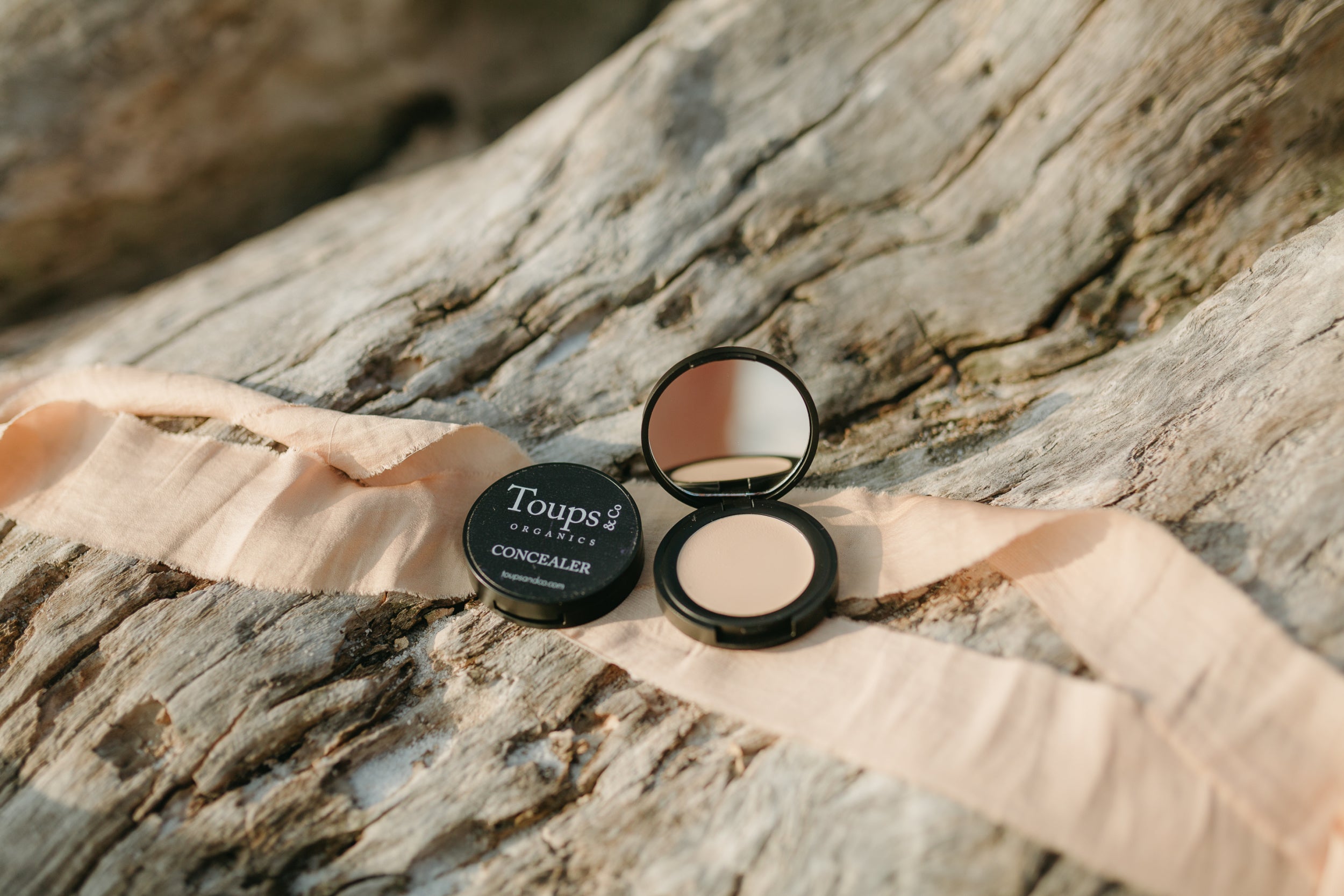Sensitive skin is one of the most common skin concerns, especially for women. The symptoms are said to stem from aging and genetics (two things we have no control over). But this isn’t the full picture. Sure, age and genetics influence the sensitivity of our skin. But a disrupted skin barrier and toxic makeup can both play a role in how your skin reacts to its environment.
By viewing our skin as an important part of our holistic health, we can address sensitive skin head-on with nutrient-dense and nontoxic products. Not only are we able to soothe symptoms, but we can also give our skin the building blocks for better functionality and fewer reactions over time.
When supporting sensitive skin, we always encourage women to start with their makeup bags. Since makeup sits on the skin all day, it’s so important that we choose intentional ingredients that are mindfully sourced. This higher makeup standard lowers your daily reactions to products and builds a stronger skin barrier that’s capable of thriving in any environment.
What Makes Concealer Appropriate for Sensitive Skin?
Your goal has always been to choose a concealer that doesn’t prompt a breakout, rash, or instant flaking. But what if your concealer could do even more for your sensitive skin?
Since concealer is one of the first products you apply during your makeup routine, it offers a unique opportunity to improve your skin barrier. To do this, here are some essential characteristics of a concealer that isn’t just gentle but also restorative…
High Ingredient Standards
When our skin reacts to a product or environment, it’s telling us something. Symptoms are our body’s way of letting us know that something isn’t quite right. Toxic chemicals and fractionated ingredients simply aren’t meant to go on our largest organ. They’re not biocompatible, and sensitive skin reacts to these ingredients as if they’re foreign (because they are).
Instead, we need to treat our skin as the ecosystem and barrier that it is. The ingredients we use in makeup and skincare should be more than nontoxic. They should actively work with our skin’s natural efforts, rather than against them.
When choosing a concealer for sensitive skin, high ingredient standards mean no synthetics, no greenwashing, no toxic fragrances, and no heavy fillers. Instead, look for ancestral ingredients, gentle oils, antioxidants, and botanicals that have been used for centuries.
Mindful Sourcing
Seed oils are a great example of cheap versus mindful sourcing. Recent research suggests that seed oils in our food (and occasionally skincare) are toxic to the body due to their processing. They’re heated to unstable temperatures and cause oxidative stress. But these same oils when fresh or cold-pressed can have an opposite (and even cell-protective) effect.
Let’s apply this example to makeup and skincare. Many concealer products are made with unstable ingredients. Fillers, chemicals, stabilizers, and preservatives are all added to cheapen the product, without actually improving your skin. Even many products that are labeled as “nontoxic” are made with poor processing methods that cause more harm than good. This is why it’s so important to ask questions and buy your makeup and concealer from a resource you trust.
Healthy Scents
Fragrance is one of the top offenders for sensitivity and allergic reactions. This is because the term “fragrance” hides a cocktail of harsh chemicals that aren’t disclosed on the product’s label. When you use a concealer with fragrance in it, you’re more likely to break out and may struggle to find the source of the reaction.
If your skin is especially sensitive, find a concealer that has no fragrance, no added chemicals, and no toxic ingredients. Most people with sensitive skin choose essential oil or herb-based fragrances that are safe and well disclosed.
Soothing Formulas
Healthy makeup formulas are so much more than nontoxic. When you choose a concealer, you should feel confident that every ingredient is working behind the scenes to soothe your skin barrier and restore your complexion. When you take your makeup off, your skin should feel soft and refreshed.
For soothing formulas, we like to use castor oil, coconut oil, cocoa butter, and vitamin E as the main components of our product. Not only does it apply well and stay all day, but it leaves your skin hydrated and less prone to sensitivity.
How to Use Concealer for Sensitive Skin
Here’s a quick refresh on how to get the most out of your concealer for sensitive skin. And if you typically avoid sensitive areas (like your under eyes) due to allergic reactions, it may be time to try again with a soothing formula.
Under Eyes
Start with a clean face and apply a face primer for sensitive skin. Then, use your finger or a makeup brush to gently apply concealer on each corner of your under eyes. Blend out gently to conceal eye bags and dark circles.
As a Highlighter
You can use concealer as a highlighter on your cheekbones, brow bones, Cupid’s bow, and inner corner of the eye. If you do this, you’ll want to apply bronzer, foundation, and blush before adding concealer to the areas of your face that naturally catch the light.
On Blemishes
Concealer helps to hide acne, redness, and other blemishes. A high-quality concealer should help restore the skin, too. Gently spot treat blemishes with concealer and then blend foundation over top.
Other Makeup for Sensitive Skin
When you have sensitive skin, a lot of the same rules apply for your other makeup and skincare products. You’ll want to find brands that value ingredient transparency, mindful sourcing, and soothing formulas. Here are a few other products to help you nourish and support sensitive skin as you restore your skin barrier:
Foundation for Sensitive Skin
When choosing a foundation for sensitive skin, we recommend a formula that uses light-weight ingredients, like aloe vera juice, vitamin E, and squalane. These ingredients are still deeply nourishing and intentional but don’t sit heavily on the skin. They shouldn’t cause irritation and will gently improve skin barrier function.
Primer for Sensitive Skin
If you have skin that easily reacts to makeup, we always recommend a primer for sensitive skin. This is an easy way to prep your pores for makeup while offering a little extra protection. Jojoba oil is one of our favorite ingredients to look for in face primer, since it’s the only plant oil that’s nearly bioidentical to our skin.
Mascara for Sensitive Eyes
Mascara is one of the most common irritants for people with sensitive skin. Since it’s applied right to the eyes, it can block oil glands while exposing you to heavy preservatives and dyes. Opt for a mascara that uses natural ingredients for color pigment (like coffee) and gentle herbs that won’t compromise your eyes.
Healthy Makeup Isn’t Just About Ingredients
Just a few years ago, ingredients were the deciding factor between toxic and healthy makeup products. And don’t get us wrong, ingredients are so important. But there are a lot more factors that go into a truly nourishing product. Ingredient sourcing and high quality processing are the next steps to effortless and powerful formulas that change the way we manage sensitive skin.

